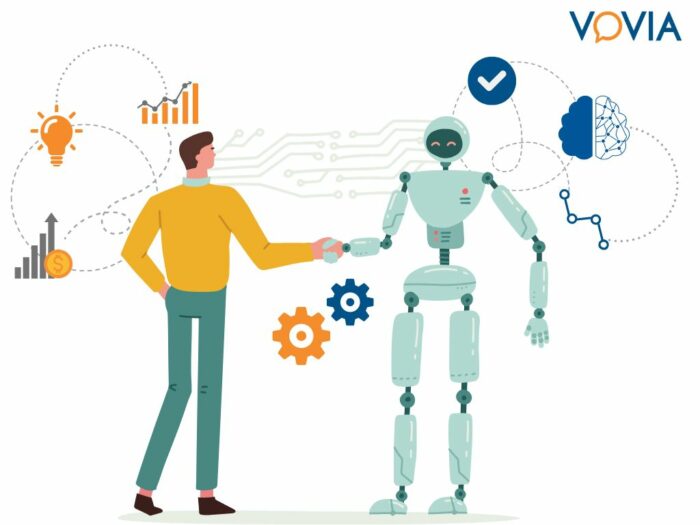5 Ways AI is Changing the Face of Digital Marketing Today
To say that artificial intelligence (AI) has been in the news as of late would be a massive understatement. The introduction of OpenAI’s ChatGPT late in 2022 followed by Microsoft announcement of a 10 billion dollar investment in OpenAI in January and the subsequent release of ChatGPT-powered Bing results has put the use of AI front and center in 2023.

While this AI revolution may seem new to the masses, AI and machine learning have been transforming the world of digital marketing for some time. Ad platforms such as Google Ads and Meta have been integrating AI/machine learning into their campaign types for a number of years, enabling advertisers to make data-driven decisions, personalize their campaigns, and automate many of the tasks done to optimize their results.
In this post, we will explore 5 ways AI is changing the face of digital marketing and how our digital and data science specialists leverage AI for planning and executing media campaigns. We will also cover some of the ethical and privacy concerns that need to be taken into consideration when leveraging AI in digital marketing.
Using AI for Personalization in Digital Marketing
Personalization is becoming increasingly important in digital marketing, as customers expect brands to provide relevant and engaging experiences. By using AI to analyze customer data, brands can create more accurate buyer personas and tailor their content, ads, and offers to each individual customer. This can lead to increased engagement, conversions, and loyalty. AI can also provide real-time recommendations, such as product suggestions or content recommendations, based on the customer’s current browsing or purchasing behaviour.
AI-powered personalization can take many forms, such as targeted ads, personalized email campaigns, or tailored product recommendations. For example, Amazon uses AI algorithms to provide customers with personalized product recommendations based on their browsing and purchasing history. Netflix uses AI to recommend movies and TV shows to viewers based on their viewing history and preferences. AI can also be used to personalize website content, such as headlines, images, and calls to action, to match the visitor’s interests and behaviour as part of a conversion rate optimization (CRO) program. Dynamic Yield is a great example of a platform that does this.
Using AI to Perform Predictive Analytics
AI can help digital marketers predict future outcomes or behaviours by analyzing historical data and identifying patterns and trends. This can help brands optimize their marketing efforts and ensure that they are targeting the right audience, with the right message, at the right time. Predictive analytics can also help identify new opportunities and stay ahead of emerging trends in industries.
Predictive analytics can be applied in various areas of digital marketing, such as lead generation, customer acquisition, and retention. For example, by analyzing historical data on customer behaviour and preferences, marketers can predict which creative is most likely to lead to engagements on different platforms. Creative teams can then use this data to create high-performing creative assets. Predictive analytics can also help marketers to predict the media investment required to hit specific sales targets. Vovia’s Data Science team uses Google Cloud and Microsoft Azure cloud computing platforms along with various data extraction tools to collect, compile and analyze data used in the predictive analytics projects.
Using AI for Optimization of Digital Marketing Campaigns
Optimization is crucial in digital marketing. It helps marketers achieve better results and maximize budgets. By using AI to automate and optimize digital campaigns, marketers can help brands improve their efficiency, reduce costs, and achieve better ROI. AI can be used to automate various aspects of specialized tasks, such as A/B testing, ad targeting, and bidding, which can save time and resources. AI can also optimize marketing campaigns in real-time, based on a massive amount of data and performance signals that no human would be capable of keeping track of improving results and reducing wasted spend.
For example, AI-powered bid optimization can be leveraged by a specialist to automatically adjust their bidding strategies for ad campaigns in real-time, based on factors such as audience, device, location, time of day, and even weather conditions. Similarly, AI-powered A/B testing can help test and optimize various elements of search campaigns, such as ad copy, landing pages, and CTAs, to improve conversions and engagement.
Using AI to Improve Customer Service in Digital Marketing
AI can also be used to improve customer service in digital marketing, by providing personalized and responsive experiences to customers. AI-powered chatbots, for example, can handle customer inquiries and provide real-time support, without the need for human intervention. This can save time and resources and improve the customer experience by providing 24/7 support.
AI can also be used to analyze customer feedback and sentiment, identifying areas for improvement and optimizing the customer experience. For example, by analyzing customer reviews and feedback on social media, brands can identify common issues or complaints and take proactive steps to address them. This can lead to higher customer satisfaction and loyalty.
Using AI for Content Creation in Marketing
AI can also be used to create and optimize content for digital marketing, such as blog posts, social media posts, and product descriptions. By using AI to analyze customer data and preferences, brands can create more engaging and relevant content that resonates with their audience. AI can also automate various aspects of content creation, such as generating headlines, summarizing text, and optimizing images.
For example, AI-powered content creation tools, such as Jasper can generate high-quality articles based on keywords and topics. These tools can save time and resources for brands and provide a scalable solution for content marketing.
Ethical and Privacy Considerations
The use of AI in marketing can raise concerns around privacy, data security, and transparency, as it involves collecting and analyzing various data points. AI can also show bias and discrimination if the algorithms are not designed or trained appropriately. Marketers should prioritize transparency and accountability when using AI in their marketing efforts, by providing clear explanations of how their algorithms work and how they use customer data.
For example, marketers need to be transparent about the data they collect, how they use it, and who they share it with. They should also provide customers with options to opt out of data collection and personalization. Brands should also be mindful of biases and discrimination in their AI algorithms and take steps to mitigate them. This can include using diverse datasets, testing for biases, and involving diverse groups of people in the design and training of AI models.
Conclusion
AI is transforming the world of digital marketing by providing marketers with new opportunities to personalize, optimize, and automate their marketing efforts. By using AI to analyze customer data, predict outcomes, and optimize campaigns, marketers can achieve better results, reduce costs, and improve the customer experience. By prioritizing transparency and accountability, marketers can harness the power of AI while also ensuring that their marketing efforts are ethical and responsible.
Marketers that leverage AI-powered marketing strategies early on are likely to gain a competitive advantage and achieve better results than those that do not.
Interested in learning more about how AI can help your digital marketing campaigns? Contact us today.
